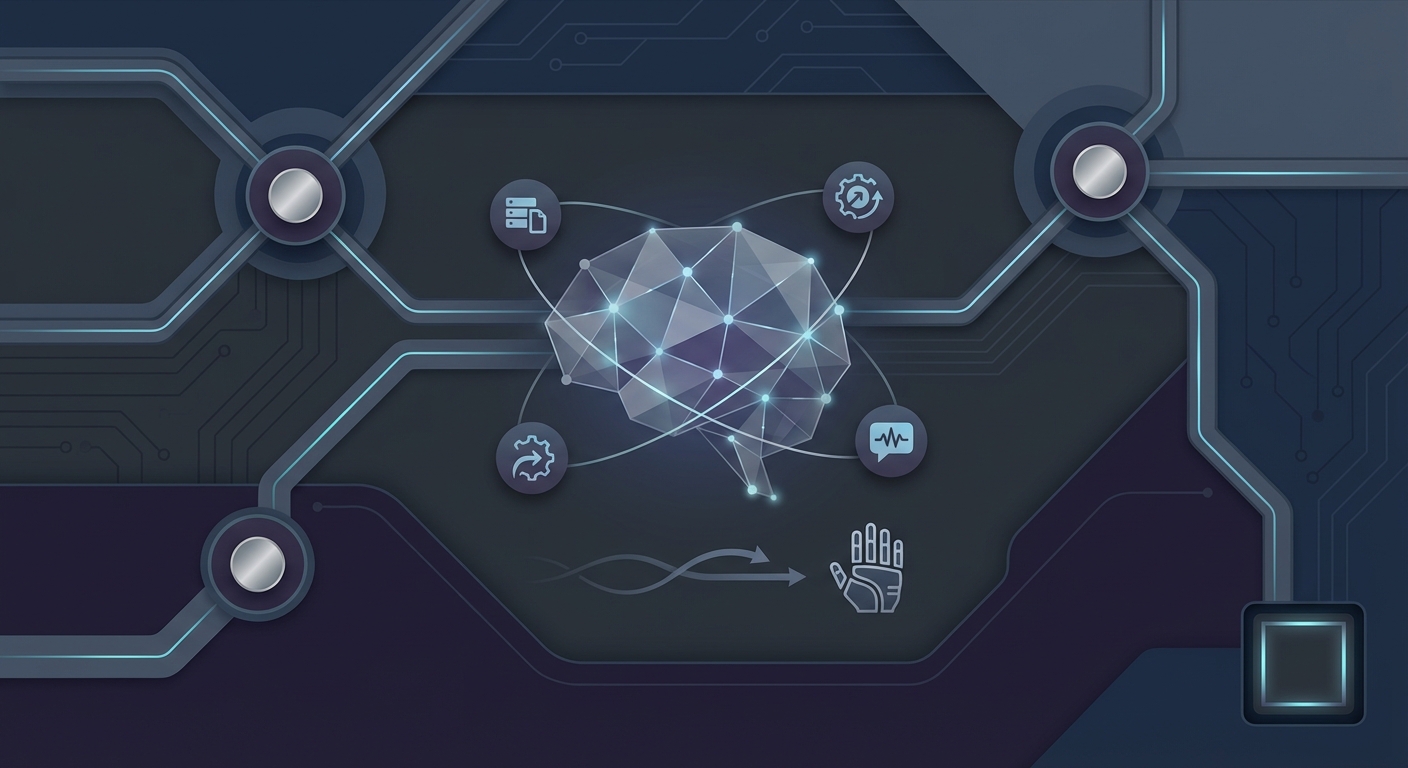Securing AI Agents with Homomorphic Encryption: A Paradigm Shift in Data Privacy
TL;DR
- This article explores how homomorphic encryption (HE) revolutionizes AI agent security by enabling computation on encrypted data, ensuring data privacy across development, deployment, and use. It covers HE's core benefits, real-world applications, technical insights, and future trends, highlighting its role in regulatory compliance, zero-trust architectures, and secure AI/ML pipelines, and the future of data privacy.
Understanding Homomorphic Encryption (HE) and Its Significance for AI Agents
Imagine a world where ai agents can analyze your most sensitive data without ever actually seeing it. That's the promise of homomorphic encryption (HE), a technology poised to revolutionize data privacy and security. Let's dive into what HE is and why it's so crucial for the future of ai agents.
Homomorphic encryption allows computations to be performed on encrypted data without decrypting it first. (What Is Homomorphic Encryption? Definition - Entrust) CyberArk explains that this ensures data remains confidential while being processed in untrusted environments. The result of the computation is also encrypted, and only the authorized user with the decryption key can access the final output.
There are three main types of HE:
- Partially Homomorphic Encryption (PHE): Supports only one type of operation (either addition or multiplication) on encrypted data. For example, you could add encrypted numbers together, but not multiply them.
- Somewhat Homomorphic Encryption (SHE): Allows both addition and multiplication, but only a limited number of times. Think of it like being able to do a few calculations, but not an endless chain.
- Fully Homomorphic Encryption (FHE): Supports unlimited addition and multiplication operations, making it the most versatile but also the most complex. This means you can do pretty much any calculation you want on the encrypted data.
Data breaches are on the rise, and privacy regulations like GDPR, CCPA, and HIPAA are becoming increasingly stringent. (How GDPR, CCPA, HIPAA, and Other Data Privacy Standards ...) Organizations face the challenge of balancing ai innovation with the need to protect sensitive data. As ai agents handle more personal and confidential information, the risk of data exposure grows exponentially.
Ai agents often process sensitive data, making them prime targets for cyberattacks. Protegrity notes that HE ensures data confidentiality during both processing and storage. By using HE, organizations can enhance trust and compliance in ai deployments, ensuring that data remains protected throughout its lifecycle.
In essence, HE offers a way to use ai without compromising privacy. This ensures responsible and secure ai implementations. Next, we'll explore the specific benefits of HE for ai agent security in greater detail.
Core Benefits of Homomorphic Encryption for AI Agents
Imagine ai agents capable of handling sensitive data without ever exposing it. Homomorphic encryption (HE) makes this a reality, offering a new level of security and privacy. Let's explore the core benefits of this technology for ai agents.
One of the most significant advantages of HE is its ability to protect sensitive data from unauthorized access. HE ensures that data remains encrypted, even during processing. This is crucial for industries dealing with highly confidential information.
- Protects sensitive data from unauthorized access. By allowing computations on encrypted data, HE ensures that even if a system is compromised, the data remains unreadable to attackers. This is vital for protecting personal information, financial records, and other sensitive data.
- Facilitates compliance with data privacy regulations. HE helps organizations meet stringent requirements set by regulations like GDPR, HIPAA, and CCPA. By encrypting data at all times, HE minimizes the risk of non-compliance and potential fines.
- Reduces the risk of data breaches and legal liabilities. Data breaches can result in significant financial and reputational damage. HE minimizes the attack surface by keeping data encrypted, thereby reducing the likelihood of a successful breach.
HE enables multiple parties to collaborate on ai development without sharing raw data. This is particularly useful in industries where data sharing is restricted due to privacy concerns.
- Allows collaborative ai development without sharing raw data. HE allows different organizations to contribute data to a common ai model without exposing their individual datasets. This fosters collaboration and innovation while maintaining data confidentiality.
- Supports secure data sharing between organizations. HE makes it possible for organizations to share data for analysis and research without compromising the privacy of individuals or the security of proprietary information.
- Promotes innovation while preserving data confidentiality. By enabling secure multi-party computation, HE encourages organizations to explore new ai applications and solutions while ensuring that sensitive data remains protected.
HE supports zero-trust security architectures for ai systems. This means that no user or system is inherently trusted, and all access requests are verified, regardless of where they originate.
- HE ensures data protection even in untrusted environments. As mentioned earlier, HE ensures that data remains encrypted, even when processed in untrusted environments. This provides a strong layer of defense against both external and internal threats.
- Supports zero-trust security architectures for ai systems. By encrypting data at all times, HE aligns with the principles of zero-trust security, which assumes that all users and systems are potential threats.
- Minimizes the attack surface and reduces insider threats. HE reduces the risk of insider threats by ensuring that even authorized users cannot access raw data. This limits the potential damage from compromised accounts or malicious employees.
With these core benefits, HE paves the way for more secure, compliant, and collaborative ai environments. Next, we'll delve into the practical applications of HE across various industries.
Real-World Applications of HE in AI Agent Deployments
Imagine casting your ballot online without anyone, not even election officials, being able to see how you voted. Homomorphic encryption (HE) is making this level of privacy a reality across various sectors.
HE is revolutionizing healthcare by enabling secure ai-driven diagnostics.
- Ai agents can analyze encrypted patient data to predict diseases without ever exposing sensitive information.
- It protects patient privacy while significantly improving diagnostic accuracy.
- HE enables secure collaboration between healthcare providers, allowing them to share insights without sharing raw data.
In finance, HE enables fraud detection and risk assessment on encrypted financial data.
- Ai agents can detect fraudulent transactions without compromising customer privacy, enhancing fraud prevention measures.
- HE supports secure credit scoring and risk assessment models, ensuring that sensitive financial data remains protected.
- This technology makes it possible to analyze financial data without ever seeing the raw, unencrypted values.
Governments are exploring HE to create secure e-voting systems that ensure voter privacy and election integrity.
- HE ensures that voter privacy and election integrity are maintained throughout the voting process.
- Ai agents can tally encrypted votes without revealing individual choices, bolstering trust and transparency in democratic processes.
- This technology could not only protect data from manipulation, it could allow it to be independently verified by authorized third parties. This is possible because HE allows computations (like tallying votes) to be performed on encrypted data. The encrypted result of the tally can then be verified by authorized parties without them needing to decrypt individual votes, thus preserving voter anonymity while confirming the accuracy of the count.
As HE technology advances, its impact on data security and privacy will only continue to grow. Next, we'll explore the limitations and challenges of using HE in AI agent deployments.
Limitations and Challenges of Using HE in AI Agent Deployments
While homomorphic encryption (HE) offers incredible potential for securing AI agents, it's not without its hurdles. Understanding these limitations is key to realistic implementation.
One of the biggest challenges is computational overhead. Performing operations on encrypted data is significantly slower and more resource-intensive than on unencrypted data. This can make real-time processing difficult for complex AI models.
- Performance degradation: HE operations can be orders of magnitude slower than their plaintext counterparts, impacting the responsiveness of AI agents.
- Increased resource requirements: Running HE computations often demands more processing power and memory, leading to higher infrastructure costs.
Key management is another critical aspect. Securely generating, distributing, and managing encryption keys is paramount. A compromised key can render the entire HE system vulnerable.
- Complexity of key management: Implementing robust key management systems adds another layer of complexity to HE deployments.
- Secure key distribution: Ensuring keys are securely transmitted and stored is a non-trivial task, especially in distributed AI systems.
The complexity of implementation itself can be a barrier. HE schemes and their associated libraries can be intricate, requiring specialized expertise to integrate effectively into existing AI pipelines.
- Steep learning curve: Developers need to understand advanced cryptographic concepts and specific HE library functionalities.
- Integration challenges: Seamlessly integrating HE into existing AI frameworks and workflows can be a significant undertaking.
Finally, potential performance trade-offs need careful consideration. While HE protects data privacy, it might necessitate compromises in model accuracy or the complexity of computations that can be performed efficiently.
- Approximation vs. exactness: Some HE schemes are better suited for approximate computations (like those in machine learning), while others are for exact calculations. Choosing the right one involves understanding these trade-offs.
- Limited operations: Depending on the HE scheme, certain complex operations might be impractical or impossible to perform efficiently on encrypted data.
Addressing these challenges will be crucial for the widespread adoption and success of HE in AI agent deployments. Now, let's look at the technical details that help us implement these solutions.
Technical Insights and Implementation Considerations
Imagine AI agents that can perform complex tasks on sensitive data without ever exposing it. To achieve this level of security, it's critical to understand the technical aspects and implementation considerations of Homomorphic Encryption (HE).
Selecting the right HE scheme is crucial for optimal performance and security. Each scheme offers unique characteristics that cater to specific computational needs.
- BFV is best for performing exact integer operations, making it it suitable for applications like census data analysis and ID analytics.
- CKKS is ideal for real-number approximate computation, which is commonly used in machine learning pipelines.
- BGV offers good performance and flexibility, particularly for logic-based computation.
Several HE libraries and Software Development Kits (SDKs) are available to facilitate implementation. These tools provide developers with the necessary functionalities to integrate HE into their applications, simplifying HE implementation and making it more accessible.
- Microsoft SEAL is widely used and well-documented, making it ideal for C++ and Python developers.
- HElib is focused on research but powerful for advanced implementations, offering flexibility for complex tasks.
- PALISADE balances performance and scalability, making it suitable for various applications.
- OpenFHE is modular and has industry backing, ensuring robust support and continuous development.
- Concrete-ML serves as the go-to toolkit for Machine Learning (ML) developers looking to deploy encrypted models.
One of the main challenges in using HE is its computational overhead. However, several techniques can mitigate these performance issues.
- Bootstrapping resets noise levels, allowing for deeper computations.
- Ciphertext packing batches multiple values into one ciphertext, reducing the overall computational load. This means instead of performing an operation on each individual piece of data, you can perform it on a group of them all at once within a single encrypted package, saving a lot of repetitive work.
- Parallelization leverages GPUs and SIMD (Single Instruction, Multiple Data) techniques, which are becoming standard.
Choosing the right HE scheme, utilizing available libraries, and addressing performance challenges are key steps toward successfully implementing HE in AI agent deployments. Next, we'll explore the future of AI agent security with HE.
The Future of AI Agent Security with Homomorphic Encryption
The future of ai agent security is not a distant dream; it's rapidly approaching. Imagine ai platforms seamlessly integrating homomorphic encryption (HE) to protect sensitive data as a standard practice.
Here are some emerging trends and technologies that will shape the future of ai agent security with HE:
- Hardware-accelerated FHE chips. These chips will significantly reduce the computational overhead of HE, making it more practical for real-time applications. This advancement will enable ai agents to process encrypted data faster.
- Standardized FHE APIs. Standardized APIs will simplify the integration of HE into existing systems, making it easier for developers to implement secure ai solutions. This will promote wider adoption and interoperability across different platforms.
- Cross-language FHE SDKs. Software development kits (SDKs) that support multiple programming languages will lower the barrier to entry for developers, enabling them to build secure ai applications regardless of their preferred language.
The integration of HE into mainstream ai platforms and data clouds is another key trend to watch.
- Integration of HE into popular AI frameworks. As HE becomes more accessible, expect to see it integrated directly into popular ai frameworks like TensorFlow and PyTorch. This will allow data scientists and machine-learning engineers to easily incorporate HE into their workflows.
- Cloud providers offering FHE-as-a-service. Cloud providers will offer FHE-as-a-service, providing organizations with a scalable and cost-effective way to secure their ai workloads. This will eliminate the need for organizations to manage the complexities of HE implementation themselves.
- Increased adoption in enterprise SaaS solutions. Enterprise Software as a Service (SaaS) solutions will increasingly adopt HE to protect sensitive customer data, ensuring compliance with privacy regulations. This will enhance trust and security in cloud-based applications.
As quantum computing advances, the need for post-quantum cryptography becomes increasingly critical.
- HE as a defense against quantum computing threats. HE is emerging as a robust defense against quantum computing threats, ensuring that data remains secure even in the face of powerful quantum computers. This is due to the underlying mathematical problems that HE relies on.
- Lattice-based cryptography and its resilience. Many HE schemes are based on lattice-based cryptography, which is considered one of the most promising approaches to post-quantum security. These schemes are designed to be resistant to attacks from both classical and quantum computers.
- Preparing for the post-quantum era with HE. Organizations must prepare for the post-quantum era by exploring and implementing HE solutions. This proactive approach will ensure long-term data security and privacy.
The convergence of these trends will pave the way for a future where ai agents can operate securely and privately, unlocking new possibilities for innovation and collaboration.
Partnering with Technokeen for AI and Automation Solutions
Technokeen is ready to help you navigate the complex landscape of ai and automation. They offer tailored solutions designed to drive business innovation and efficiency.
Technokeen specializes in developing custom AI solutions tailored to specific business needs.
- They leverage domain-driven expertise with agile development practices to deliver scalable solutions.
- Their focus is on creating ai agents that seamlessly integrate with existing business processes and workflows.
- By working closely with clients, Technokeen ensures that ai solutions align with their unique goals and challenges.
Technokeen streamlines operations with intelligent automation.
- Their solutions reduce manual tasks and improve productivity through robust Business Process Automation & Management Solutions.
- These solutions ensure consistent and reliable performance, while advanced UX/UI design enhances user experience and drives adoption.
- This approach not only optimizes workflows but also empowers employees to focus on more strategic initiatives.
Technokeen understands the importance of a strong digital presence.
- They offer cloud consulting services for AWS/Microsoft, hosting, and backups to ensure data security and accessibility.
- Additionally, their digital marketing services, like SEO and performance campaigns, enhance visibility and engagement.
- By providing professional services automation and application modernization, Technokeen keeps businesses ahead of the curve.
With Technokeen's expertise, organizations can confidently embrace ai and automation to achieve their strategic objectives.
Conclusion: Embracing Homomorphic Encryption for a Secure AI Future
Imagine ai agents safeguarding your most sensitive information, ensuring that privacy is not a luxury but a guarantee. As we conclude our exploration of homomorphic encryption (HE), it's clear that this technology is pivotal for a secure ai future. In fact, HE represents a true paradigm shift in how we approach data privacy and security within ai systems.
HE offers a multitude of benefits that address critical security and privacy concerns:
- Enhanced data security, compliance, and zero-trust environments. HE ensures data remains encrypted, even during processing, aligning with zero-trust architectures and facilitating compliance with regulations like GDPR and HIPAA.
- Enabling secure multi-party computation and collaborative AI development. HE allows organizations to collaborate on AI projects without exposing raw data, fostering innovation while maintaining confidentiality.
- Real-world applications in healthcare, finance, and government. From secure AI-driven diagnostics to fraud detection and e-voting systems, HE is already transforming industries.
Data privacy is no longer optional; it's a fundamental requirement for building trustworthy and ethical ai systems. Prioritizing data privacy in ai initiatives is essential for several reasons:
- Building trust with customers and stakeholders. When individuals trust that their data is protected, they're more likely to engage with ai-driven services and share valuable information.
- Meeting regulatory requirements and avoiding legal risks. Non-compliance with data privacy regulations can result in significant fines and reputational damage.
- Fostering innovation and ethical AI development. By ensuring data privacy, organizations can unleash the full potential of ai without compromising ethical principles.
The time to act is now. Embrace HE to secure your ai initiatives:
- Assess your organization's data privacy needs. Understand the specific risks and compliance requirements relevant to your industry and data types.
- Evaluate available HE tools and libraries. Explore options like Microsoft SEAL and OpenFHE to find solutions that fit your technical capabilities and project requirements.
- Partner with experts to implement secure AI solutions. Engage with ai and automation specialists to navigate the complexities of HE implementation and ensure optimal security.
"In the future, asking if your data is encrypted will be like asking if your car has seatbelts. Of course, it does."
By embracing HE, organizations can unlock the full potential of ai while safeguarding data privacy and building a secure, trustworthy digital future.







